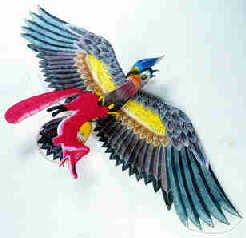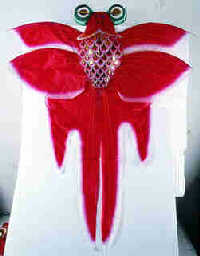 Kites were invented by the Chinese people over 2000 years ago. About in the 12th century, Chinese kite spread to the West, and the oriental and Western kite culture was formed after years of development. In this process, Chinese traditional culture integrated with the kite craft, and finally formed the kite culture with unique characteristics.
Kites were invented by the Chinese people over 2000 years ago. About in the 12th century, Chinese kite spread to the West, and the oriental and Western kite culture was formed after years of development. In this process, Chinese traditional culture integrated with the kite craft, and finally formed the kite culture with unique characteristics.
Uses of kite have been changed several times in history. According to historical record, kite was first used in military. In the mid Tang Dynasty (618-907), in which the society was stable and peaceful, the use of kites was gradually changed from military to entertainment. With the innovation of papermaking, the raw material of kite changed from silk to paper. Kite became popular among civilians with a richer variety of forms and reached the peak point in the Song Dynasty (960-1279). Participated by the literary, the making and the decoration of kites underwent great development. Kite making became a profession due to the large demand.
The Ming (1368-1644) and Qing dynasties, was the peak period of the Chinese kite. The kites underwent great development in size, design, decoration and flying skills. Literators at that time made kite by themselves, and sent to relatives and friends as a gift, regarding it a literary pursuit. In resent years, kite flying has publicized as a sports activity as well as entertainment.
 Workmanship of Chinese kites
Workmanship of Chinese kites
The workmanship of Chinese kites can be summarized in four points: structuring, paperhanging, color drawing, and flying.
Structuring includes: selecting bamboo, chopping bamboo, bending bamboo, and joining bamboo.
Paperhanging includes: selecting material, cutting out, paperhanging, and cutting away or adding material as needed.
Color drawing includes: composing picture, outlining, dyeing (or coloring), and decorating.
 Flying includes: selecting site and weather, choosing the kite, launching the kite into the air, adjusting the line, and controlling the kite.
Flying includes: selecting site and weather, choosing the kite, launching the kite into the air, adjusting the line, and controlling the kite.
To make a kite, first, the right kind of bamboo strips must be selected for the frame. It should be thick and strong for a kite of large dimensions in order to stand the wind pressure. The regular paper or sometime silk is used to cover the frame. Silk kites, especially, are more durable and generally of higher artistic value. Third, painting the kite may be done in each way.
China has a large area of territory. As a traditional culture and folk art, kite has formed unique style of different regions during its development, among which the most famous ones are the styles of Beijing, Tianjin, Weifang in Shangdong Province, Sichuan and Guangdong Province .
 Art genre & characteristics of Chinese kites
Art genre & characteristics of Chinese kites
The art of Chinese kites has developed endlessly alongside the long history of the nation's cultural traditions. Each kind of kite art has its strong point due to its strong affinity with each rich and colorful historical period. The specific kite art and firmly relates with the music, dance, drama, folk-custom, and religion of their respective areas.
